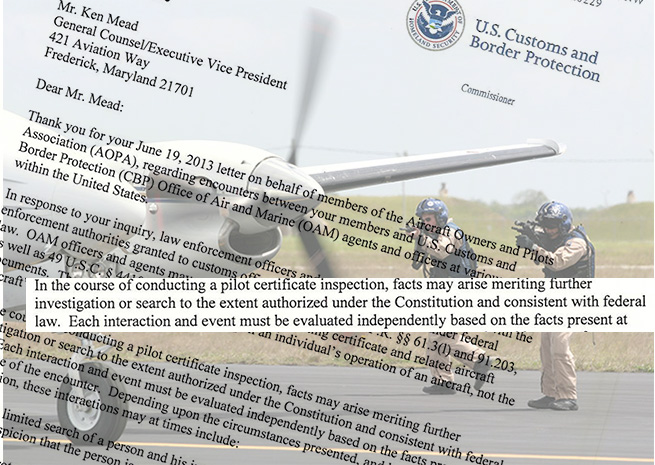A questionable rationale
CBP: Ramp check regulation basis for criminal searches

U.S. Customs and Border Protection (CBP) says a little-used administrative regulation gives it the authority the stop general aviation pilots and search their aircraft, even on flights that never leave the United States. But AOPA is demanding the agency put a stop to the indiscriminate stops of general aviation aircraft. Of further concern are stops that result in pilot or aircraft searches without probable cause or reasonable suspicion.
In June, AOPA General Counsel Ken Mead sent a letter to CBP asking the agency to explain its legal authority for conducting stops and searches on general aviation aircraft in locales like Iowa City, more than 100 miles from any international border.
In an Aug. 12 response to that letter, Thomas S. Winkowski, acting commissioner of CBP—an arm of the U.S. Department of Homeland Security and the agency that electronically monitors thousands of private domestic aircraft flights in real time—cited regulations allowing any federal agent to check pilot and aircraft documents as the basis for stopping, searching, and sometimes detaining, law-abiding general aviation pilots on domestic flights.
“In the course of conducting a pilot certificate inspection, facts may arise meriting further investigation or search to the extent authorized under the Constitution and consistent with federal law,” Winkowski wrote in his response.
More than 40 pilots have shared with AOPA their accounts of being stopped, sometimes more than once on the same trip. Some of those pilots were searched and detained by CBP agents while others were greeted at the ramp by local law enforcement acting on CBP requests. In some cases, local police reportedly used dogs to inspect aircraft, using alleged alerts to demand a more intrusive and invasive search of passengers, baggage, and aircraft interiors.
A preliminary analysis of Winkowski’s response likens ramp checks by CBP to tasking FBI agents with seatbelt checks, noting that, as far as AOPA has been able to ascertain, the FAA has not asked for help with ramp checks from any other agency.
Winkowski said possible justifications for further search may include “reasonable suspicion” that the pilot is “armed and dangerous,” or that a person is hiding in the aircraft with intent to “impede or assault” an agent.
AOPA attorneys continue to analyze the issue, but have thus far found no law or regulation empowering armed federal border security agents to conduct criminal investigations of domestic flights at airports far from any border crossing or entry point.
An initial legal analysis by AOPA attorneys suggests that federal authority to conduct a ramp check does not empower agents to conduct criminal investigations unrelated to the safe operation of the aircraft. Furthermore, the statutory authority granted to CBP does not extend inland of the borders, though AOPA has documented many cases involving CBP or CBP-directed searches of aircraft that never flew near a border.
AOPA’s legal team also noted that officers have no authority to check whether documents are displayed within the cockpit or cabin, a pretext that has been used to initiate aircraft searches.
Any pilot who refuses to provide photo identification, a pilot or medical certificate, or registration document to a law enforcement official on request may be considered in violation of federal aviation regulations but no other law, AOPA attorneys noted. Enforcement of those regulations is the sole purview of the FAA.
AOPA is working with supporters in Congress to put an end to federal government practices that violate the civil rights of pilots and passengers, and represent a misuse of federal resources earmarked for border protection.
While those efforts continue, pilots who have been approached by law enforcement officials are encouraged to tell AOPA about their experiences using a simple online form. Pilots are also urged to download AOPA’s kneeboard-formatted checklist, “What to do if stopped by law enforcement," which has been updated recently in light of ongoing legal analysis.
Following up on a June webinar covering what is known, and what is not, about government aircraft searches, AOPA Pilot Protection Services will cover the mosr recent developments in a Sept. 25 webinar. AOPA Pilot Protection Services participants have priority admission to this webinar, and other members may also sign up, space permitting.
What to do if stopped by law enforcement
AOPA continues to research the legal specifics involved when federal agents, particularly Customs and Border Protection agents acting well inside the nation's borders, detain a pilot and search an aircraft.
As the association works to gain a fuller understanding of what is permitted, a convenient kneeboard reference card has been revised and updated from a previous version issued in July. This updated step-by-step guide includes general procedures to follow when subjected to detention and search. Always be courteous and respectful, and remain calm. Answer questions truthfully, but succinctly: Do not volunteer information.
Download guide



